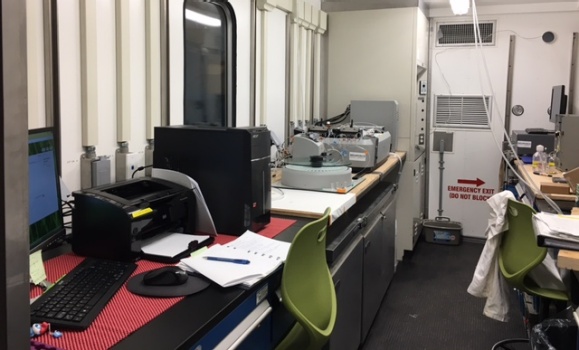News
» Go to news mainCERC.OCEAN's Container Lab is Going to Sea

Five of our laboratory members (Claire, Ricardo, Lin, Liz, and Lachlan) are eagerly preparing to join a group of Irish, German, UK, and US scientists onboard the Irish vessel the R/V Celtic Explorer, travelling from St. John’s, Newfoundland, to Galway, Ireland, from April 27 to May 23, 2017. This is an A02 Go-SHIP cruise, which aims to obtain high quality, high resolution data in order to create a global network of data as part of the global ocean/climate observing system. Specifically, this cruise – sponsored in part by the Ocean Frontier Institute (OFI) from Dalhousie Univeristy – will analyze nutrients and carbon variables (pCO2, CO2, DIC, etc.) in addition to temperature, salinity, oxygen, and physical parameters.
This cruise also marks the maiden voyage of our mobile laboratory, which is a shipping container that has been designed to become a chemical oceanography lab. Inside our moveable lab, which is approximately 20 ft long and 8 ft tall, we have a fume hood, sink, lab benches, and equipment, as well as a Skalar San ++ Nutrient AutoAnalyzer, a PortaSal Salinometer, and an Apollo Dissolved Inorganic Carbon (DIC) analyzer connected to a Picarro Cavity Ring Down Spectroscopy (CRDS) stable isotope carbon analyzer, which will all be used onboard the Celtic Explorer. We’ll also have a computer and laptop within the container and typically 3 – 4 scientists will be working inside it at a time.
Having a moveable lab is beneficial because it means that we can ship our lab as it is and we don't have to worry about setting up a new lab space on board once we arrive. This will not only save us time, but it means we know how much space we have, we don’t have to share limited space with other scientists, and we can bring instruments that are already set up and calibrated, instead of dismantling them and packing them in boxes. Most of the instruments we are bringing with us would not be brought were it not for the container, since taking apart the instrument would not only be time consuming, but would lead to additional set-up time before the instruments would be properly calibrated and we would be sure that the data were accurate.
We are all working hard to finish packing up our supplies and equipment in order to ship the container to Newfoundland in early April.
Participation of the group from Dalhousie University is supported by the Canada Excellence Research Chair in Ocean Science and Technology. However, the overall cooperation between the groups on the cruise is an example of growing cooperation in research on the North Atlantic Ocean that will be the focus of the recently-founded Ocean Frontier Institute (OFI). The OFI is a transnational partnership that has been established through major funding to Dalhousie University, the Memorial University of Newfoundland and Labrador, and the University of Prince Edward Island under the Canada First Research Excellence Fund. The Marine Institute, Galway, GEOMAR and Woods Hole Oceanographic Institution are all partners in the OFI which is focussed on “Safe and Sustainable Development of the Ocean Frontier”. The A2 cruise is an example of joint expeditions, shared research goals and personnel exchanges that will be developed under the OFI in coming years.
Be sure to follow the CERC.OCEAN page for more details about the Celtic Explorer, A02 Go-SHIP cruise, and the maiden voyage of our container.
Recent News
- ASITA 2024 Conference
- Happy World Ocean Day! + CMOS congress 2023 recap
- Upcoming presentations by CERC.OCEAN lab at the CMOS 57th congress
- UPDATED: List of Instrumentation and Analytical Services
- Field Report: Exploratory Study of nitrogen cycling at the Lagoon Lagos
- Marine Robots – Back in Action at OHMSETT
- Spotlight of the month: Adriana Reitano
- Cruise Report: MORI‑2 cruise

